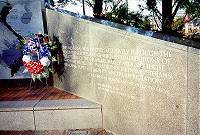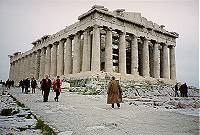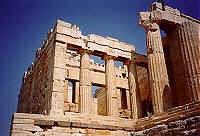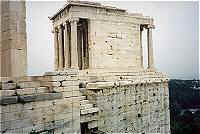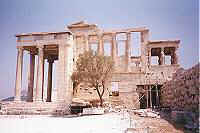|
Pericles' Funeral Oration
Pericles and
America
Pericles and Philadelphia
Aeschylus' Oresteia
Sophocles'
Oedipus and the Sphinx
Plato's Apology
Plato's Crito
Yet
to be illustrated:
Dr.
J's Lecture on Socrates
|
|
this page is very much under construction. Please be patient.
Dr.
J's Illustrated Pericles' Funeral Oration and Philadelphia (still
being edited...)
Honoring
Philadelphia's War Dead |
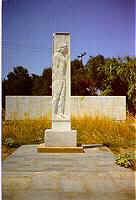 If you walk around a town a bit, and keep your eyes
open, you will be surprised how many monuments there are to those Philadelphians who fell
in the defense of democracy and freedom and who are honored for what Pericles calls
"extraordinary valor." On the left is the reconstructed ancient memorial
which lists the names and of each Athenian soldier - according to his tribe - who
died fighting the Persians at Marathon. Below are views of the Philadelphia memorial
(along Penn's Landing, but across the street from the river) that recognizes in much the
same way - names inscribed in marble - the similar very special sacrifice made by each and
every Philadelphian soldier who died in the defense of freedom in South Vietnam. The
design of this Philadelphian Vietnam Memorial has its model in Washington D.C. If you walk around a town a bit, and keep your eyes
open, you will be surprised how many monuments there are to those Philadelphians who fell
in the defense of democracy and freedom and who are honored for what Pericles calls
"extraordinary valor." On the left is the reconstructed ancient memorial
which lists the names and of each Athenian soldier - according to his tribe - who
died fighting the Persians at Marathon. Below are views of the Philadelphia memorial
(along Penn's Landing, but across the street from the river) that recognizes in much the
same way - names inscribed in marble - the similar very special sacrifice made by each and
every Philadelphian soldier who died in the defense of freedom in South Vietnam. The
design of this Philadelphian Vietnam Memorial has its model in Washington D.C. We can only hope that Pericles' words also
apply to ourselves:
"Realize for yourself the
power of Athens, and feed your eyes upon her day after day, till you become her devoted
lover. Then, when all her greatness breaks upon you, reflect that it was by courage, sense
of duty and a keen feeling of honor in action that men were enabled to win all this, and
that no personal failure in an enterprise could make them consent to deprive their country
of their valor, but they laid it at her feet as the most glorious contribution they could
offer. By this mutual offering of their lives made by them all, they each of them
individually received that renown which never grows old. For a sepulchre they have won not
so much that tomb in which their bones are here deposited, but that noblest of shrines
wherein their glory is laid up to be eternally remembered upon every occasion on which
deed or story shall fall for its commemoration. For heroes have the whole earth for their
tomb."
|
The
Individual and the Community
in Athens |
| Pericles praises
Athens for her form of government - democracy - because it is only in a democracy that
citizens are encouraged to contribute and participate in self-rule. Democracy brings
equality, merit brings public success, social and economic mobility is encouraged, the law
protects all: "We alone consider
the man who refuses to take part in city affairs useless," Pericles announces. And he gets in a jab at Sparta
by proudly proclaiming that "rather
than look upon discussion as a stumbling-block in the way of action, we think it is an
indispensable preliminary to any wise action at all." The institutions of Athenian democracy back
up Pericles' claim: ordinary citizens made up almost all the governing bodies of 5th
century Athens, including the Ekklesia, the boule, and the prytaneis.
The Ekklesia, or Assembly, which passed laws and made policy decisions, met on
the Hill of the Pnyx (all citizens were eligible to attend such meetings and speak up).
The Boule, or Council of the 500, was charged with administering decisions made
by the Ekklesia and met in the Bouleterion in the Agora. The prytaneis,
or "Presidential Council," was a subcommittee of the boule and lived at
state expense in the tholos, or "Round Building" in the Agora. By
Pericles' time, the Areopagus (named for the Hill of Ares it sits on) had lost a
lot of its power since the previous era, but it was still the court where murder cases
were tried.
 |
 |
 |
 |
| Pnyx |
Bouleterion |
Areopagus |
Tholos |
You might see similarities with
our own representative federal system as well as with state and city-level government. In
fact, things aren't really all that different here in Philadelphia today, except that
perhaps American citizens are more likely to wonder what "our country can do for us
rather than what we can do for our country." But even our own Philadelphia literally
revolves around City Hall (it is the hub of the city planner's wheel) - where laws
are conceived, legislated and enforced - and where average citizens participate in
self-governing by voting and serving on juries. And I bet the
nine dollars a day earned by jurors today is about equivalent to the two obols they got in
Pericles' time! |
Pericles persuades
the people of Athens to allow public funds to be spent on the bulding of the Parthenon by
suggesting that if they refuse to finance the project, they forfeit all future bragging
rights: "Let it be charged to my
account, not yours - only let the new edifices be inscribed with my name, not that of the
people of Athens." (Plutarch's
Life of Pericles; tr: Eduard C. Lindeman) Of course, although the people of Athens then encouraged Pericles to use
public funds, and the Parthenon officially became the achievement of a city, it is
Pericles whose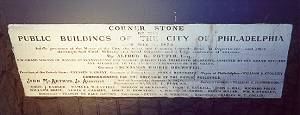 name will always be connected with it. If you visit City Hall in
Philadelphia and look closely at the corner stone of the building (left open to view in a
deep hole somewhere in one of the covered walkways), you will find this notice marking
City Hall similarly as a "Public Buildings of the City of Philadelphia" and on
this notice you will find all the names of the men who held office during that time.
Certainly their duty as officers of the public trust resulted in this monument to their
age. name will always be connected with it. If you visit City Hall in
Philadelphia and look closely at the corner stone of the building (left open to view in a
deep hole somewhere in one of the covered walkways), you will find this notice marking
City Hall similarly as a "Public Buildings of the City of Philadelphia" and on
this notice you will find all the names of the men who held office during that time.
Certainly their duty as officers of the public trust resulted in this monument to their
age.
|
| In much the same way that
Pericles built a City of Temples atop the Acropolis (above), the city of Philadelphia
chose to design the new Fairmount Waterworks in much the same way (below). Greek Revival
architecture (a big interest of mine and soon to appear in its own right on this website)
sought to re-capture the glory and of a fresh and impressive democracy by copying the
magnificent architecture of the Greeks of Pericles' Age.
(sorry - photos not yet available...)
Other examples of Greek Revival architecture in Philadelphia:
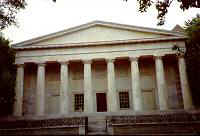 |
|
|
|
| The 2nd National Bank was designed
to look exactly like the Parthenon, except without the decorative
sculpture... |
|
|
|
|
Is
Pericles' Speech a Eulogy or
a Pep Rally/Enlistment Drive? |
| What Pericles talks
about in his oration is almost eclipsed in importance by how he delivers the
message. It is Pericles' rhetoric that makes this speech famous and the model for so many
others in the course of history (in your IH Guide you will find Lincoln's
Gettysburg Address, but one example). Rhetoric can be defined as "the
power to persuade." Throughout his speech, Pericles holds up glory as the richest
incentive for men to jump into the fray: Athens is a glorious city because of the
sacrifices of previous generations of men, and this generation, too, must shoulder its
burden. And while fighting for your country can help bring about a victory, it also has
the benefit of bringing you personal glory, something Pericles hawks as a rare and
precious commodity and gained in no other way but by dying for your country:
Pericles' speech is certainly
persuasive - and its emotionality is very much based in reality. Go to Arlington National Cemetery in Washington, D.C.
and see what Pericles is talking about. It is a powerful experience to see a nation pay
homage to its war dead. |
excerpts of Pericles'
Funeral Oration taken from R. Crawely's translation of Thucydides' Peloponnesian War
|
copyright
2001 Janice
Siegel,
All Rights Reserved
send comments to: Janice Siegel (jfsiege@ilstu.edu)
date this page was edited last:
11/27/2005
the URL
of this page:
|

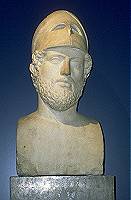


 If you walk around a town a bit, and keep your eyes
open, you will be surprised how many monuments there are to those Philadelphians who fell
in the defense of democracy and freedom and who are honored for what Pericles calls
"extraordinary valor." On the left is the reconstructed ancient memorial
which lists the names and of each Athenian soldier - according to his tribe - who
died fighting the Persians at Marathon. Below are views of the Philadelphia memorial
(along Penn's Landing, but across the street from the river) that recognizes in much the
same way - names inscribed in marble - the similar very special sacrifice made by each and
every Philadelphian soldier who died in the defense of freedom in South Vietnam. The
design of this Philadelphian Vietnam Memorial has its
If you walk around a town a bit, and keep your eyes
open, you will be surprised how many monuments there are to those Philadelphians who fell
in the defense of democracy and freedom and who are honored for what Pericles calls
"extraordinary valor." On the left is the reconstructed ancient memorial
which lists the names and of each Athenian soldier - according to his tribe - who
died fighting the Persians at Marathon. Below are views of the Philadelphia memorial
(along Penn's Landing, but across the street from the river) that recognizes in much the
same way - names inscribed in marble - the similar very special sacrifice made by each and
every Philadelphian soldier who died in the defense of freedom in South Vietnam. The
design of this Philadelphian Vietnam Memorial has its 

